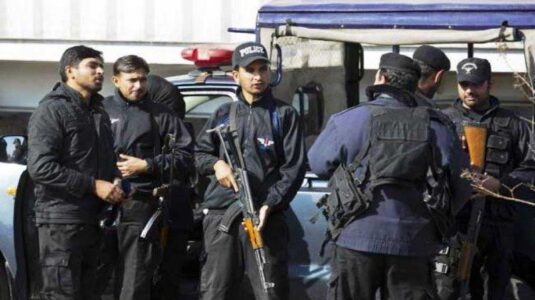
US-Pakistan Counterterrorism Dialogue and the Regional Terrorism Situation
On March 6-7, the U.S.-Pakistan Counterterrorism Dialogue took place at the Ministry of Foreign Affairs in Islamabad. The two-day meeting discussed the evolving counterterrorist landscape in Pakistan and mutual regional and global (asymmetric) threats requiring Islamabad-Washington cooperation, such as combating terrorism financing and initiatives for preventing and countering violent extremism (PCVE). The U.S. side was led by the Department of State’s Acting Coordinator for Counterterrorism Christopher Landberg, while the Pakistani side was headed by the Ministry of Foreign Affairs’ Additional Secretary for the U.N. and Economic Diplomacy Syed Haider Shah.
The U.S.-Pakistan Counterterrorism Dialogue has taken place against the backdrop of Tehreek-e-Taliban Pakistan (TTP)’s resurgence in Pakistan. Since the revival of the Taliban’s rule in Afghanistan, terrorism has surged in Pakistan by 52 percent. The TTP has carried out some high-profile attacks in Pakistan, including a gun-and-bomb attack on a police office in Karachi in February and a suicide attack in Islamabad in December.
The Islamic State of Khorasan Province (ISKP) continues to defy the Taliban’s ruthless crackdown and has been targeting Taliban leaders and fighters. For instance, on March 9, an ISKP suicide bomber eliminated the Taliban’s governor in Balkh province Mohammad Dawood Muzammil who was previously the governor of the eastern Nangarhar province and effectively led the fight against ISKP. In 2022, Muzammil was moved to Balkh to spearhead the crackdown against the terror group.
On March 16, U.S. Central Command’s General Michael Kurilla noted that ISKP is six months away from achieving the capability to launch attacks against the U.S. and Western interests abroad. Likewise, the threat of al-Qaida, despite its weakening, remains resilient and potent regionally and globally.
According to the February report of the U.N. Sanctions Committee on al-Qaida and ISIL, Saif al-Adel is al-Qaida’s new undisputed leader who lives in Iran. Given these threats coupled with a lack of cooperation or coordination with the Taliban regime, the U.S.-Pakistan Counterterrorism Dialogue has gained immense salience.
Another important development that preceded the U.S.-Pakistan Counterterrorism Dialogue was the February 20 meeting of a newly formed group of Western nations in Paris represented by special envoys and representatives for Afghanistan of Australia, Canada, the European Union, France, Germany, Italy, Norway, Switzerland, the United Kingdom, and the U.S. The meeting was kept under wraps and its joint statement was made public on March 7, the same day when the U.S.-Pakistan Counterterrorism Dialogue concluded. In the Paris meeting, the Western countries endorsed Pakistan’s position that the TTP was operating from Afghanistan and that it posed a regional threat not just to Islamabad but to Western nations as well.
Pakistan has welcomed this development. Before this, in December 2022, the U.S. designated the TTPs’ deputy leader Qari Amjad as a Specially Designated Global Terrorist (SDGT). When the U.S. withdrew from Afghanistan in August 2021, it considered al-Qaida and ISKP as two main threats to its security and excluded TTP. The inclusion of TTP in the U.S. threat list, alongside al-Qaida and ISKP, has been done on Pakistan’s insistence to forge meaningful counterterrorism cooperation.
Given the poor state of its economy, Pakistan lacks the resources to carry out a large-scale military operation against TTP in the Afghanistan-Pakistan border region. Hence, the U.S.-Pakistan Counterterrorism Dialogue has become vital for Pakistan to gain critical support. At this juncture, Pakistan is conducting intelligence-based operations against terrorist groups in the ex-FATA (Federally Administered Tribal Areas) region and the restive Balochistan province.
In September 2022, the Biden administration approved a $450 million assistance package for the sustainment of Pakistan’s F-16 fighter jet fleet to enable the country’s fight against terrorist groups. Similarly, the U.S. Central Command Chief General Michael Kurilla visited Pakistan in December 2022 where he met Pakistan’s new military leadership at the General Headquarters (GHQ) and visited the Pakistan-Afghanistan border to observe the conditions and counterterrorism operation in the region as well as discuss the avenues to strengthen military-to-military ties. These developments point to a consistent, albeit limited-scale counterterrorism cooperation between Pakistan and the U.S.
In return, Pakistan is extending (human) intelligence cooperation to the U.S. in Afghanistan and keeping its airspace over Afghanistan open for any potential drone strikes against high-value targets. At the same time, Pakistan is desperately seeking military assistance, such as Coalition Support Funds, to bridge the existing financial gaps and initiate a large-scale operation against TTP.
However, the U.S. is only willing to provide modest funding for the PCVE initiatives, not counterterrorism. The U.S. is also exploring avenues to build the counterterrorism capacity of the paramilitary Frontier Corps (FC) and Khyber Pakhtunkhwa’s police, which are Pakistan’s frontline responders against TTP’s onslaught from Afghanistan. For instance, the U.S. is assisting Khyber Pakhtunkhwa police with investigative skills on scientific lines and providing modern equipment for counterterrorism.
Although Afghanistan has not attracted droves of foreign militants after the U.S. withdrawal and the Taliban’s return to power, the presence of groups like al-Qaida, ISKP and TTP makes it dangerous enough to keep cooperative and collaborative mechanisms like the U.S.-Pakistan Counterterrorism Dialogue open and intact. Going forward, the U.S.-Pakistan counterterrorism cooperation will evolve as the threat of terrorism evolves in Afghanistan.
Source » thediplomat





